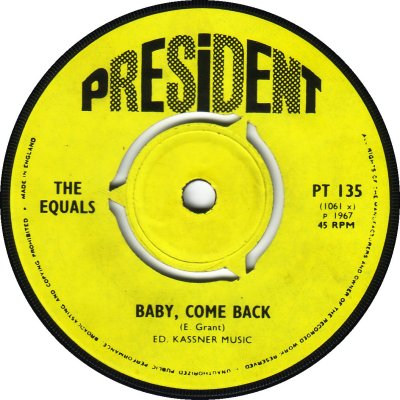
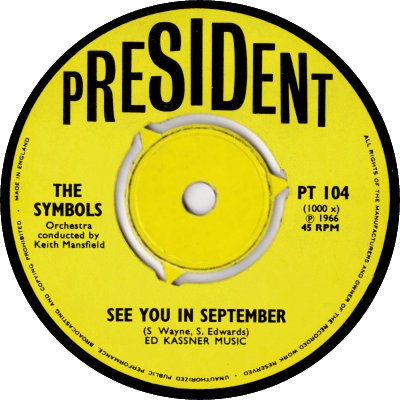
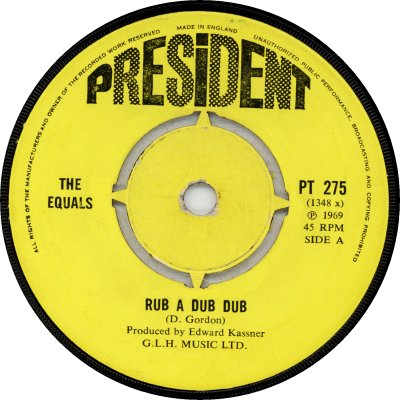
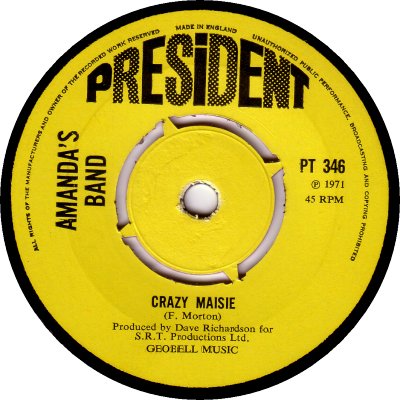
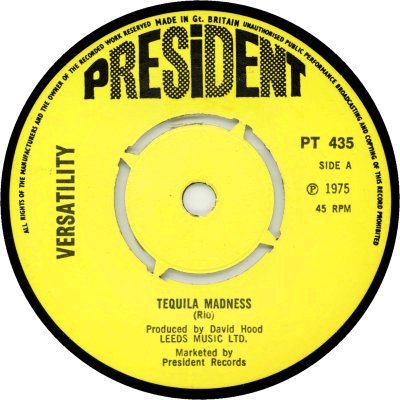
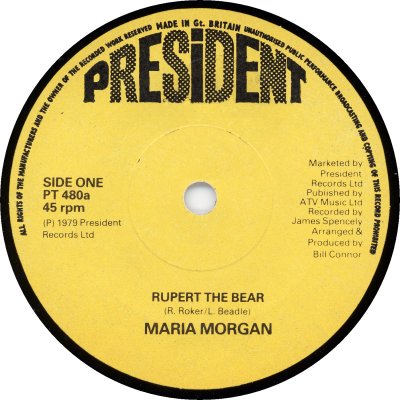

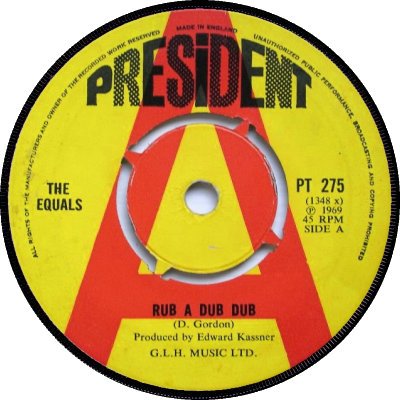
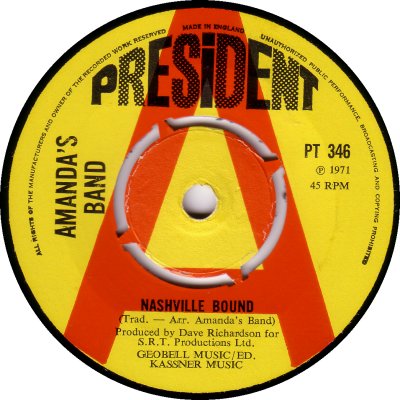
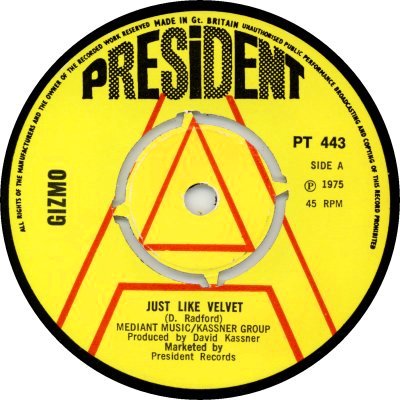
A long-lived independent. The original President Records Inc. was set up by songwriter and music publisher Edward Kassner in America in 1955, and it put out its first records that same year. Kassner formed a UK branch of the company two years later, but the President label as such didn't appear here until the mid '60s. A retrospective in 'Record Retailer' of the 1st of August 1968 observed that Kassner's original music publishing company had diversified into record production in the late 1950s; during the first half of the '60s it had leased most of its productions to Decca, but in September 1966 it had launched its own record label, President. According to the article the company had enjoyed 'tremendous success' in this country and abroad, with the Equals and 'several new recording artists'. From 1968-70 a string of eight hits from the Equals, including a No.1 in 'Baby Come Back' b/w 'Hold Me Closer' (PT135; 4/68) helped to see President firmly established as a force in the music business; Felice Taylor enjoyed a No.11 in the shape of 'I Feel Love Comin' On' b/w 'Comin' On Again' (PT-155; 9/67), and The Pyramids, The Symbols (twice) and Dorothy Squires (three times) all made inroads into the Top 50 before the Seventies had got into their stride. The hits dried up in that decade, on the actual President label, but the company went on to introduce the 'Miami Sound' to this country via its Disco / Soul label Jay Boy (q.v.), and reaped ample reward with seven hits from George McCrae (including two Top 10 entries and a No.1 in 'Rock Your Baby (Parts 1 and 2)' (BOY-85; 7/74) and eleven from K.C. & The Sunshine Band. All this Chart action was not an unmixed blessing, as the company's facilities struggled to cope with the demand for the records: in an interview in 'MW' of the 23rd of October 1976 Kassner is quoted as saying that the hits were "marvellous and horrendous - we were back in the hands of the majors again." For better or worse a sister label to Jay Boy, 'Seville' (q.v.), managed just one Top 50 single, courtesy of Dooley Silverspoon and his 'Let Me Be The Number One (Parts 1 and 2)' (SEV-1020; 12/75). As well as issuing its own records President expanded its interests to the extent where it was able to offer a complete package to small independent companies, as detailed a couple of paragraphs below. As a result it ended up servicing a host of minor but interesting labels, including, at various times, Alaska, Aquarius, Beggar's Banquet, Boxa, Bulldog, Channel, Charly, Chiswick, Cream (1), Dart, Den-Mark, Enterprise, Galaxy, Gemini, Gold, Mint, PVK, Rainbow (1), Riverdale, Seven Sun, Sioux, Sky, Spiral (2), Sticky, Strawberry, Sunlight, Superbad, Survival, Tangsong, Thunderbird, Torpedo, VC, and Zara (q.v. all). Happily, the company is still in operation today (2021).
President's singles - there were a lot of them - covered most kinds of music, from MOR Vocal to Heavy Rock, via Pop, Psychedelia and Reggae, and they appeared in a fairly steady stream into 1990, but they tended not to sell in great quantities. As a result its catalogue offered a large number of interesting obscurities. The label design stayed basically the same from 1967 on, with only minor variations: the 'prohibitions' around the perimeter started off at the bottom (1) and moved to the top in the summer of 1969 (3). At the end of that same year the angle and size of the artist's name changed (4); a few issues before that date had had the name at 90 degrees in that way but the practise seems to have been restricted to artists with long names. Around May 1974 the 'Made in England' at the top became 'Made in Gt. Britain' (5), while in March 1978, with PT-472, the artist name migrated to the bottom of the label (6). The unshaded lettering in the logo of the second scan seems to have been a one-off (2). Promotional copies had a large red 'A' on them (7), which grew in size from July 1969 (8, 9) and hollowed out in May 1974 (10). The same style was used for promos on several of the labels that the company handled, though the colour of the hollow 'A' was sometimes changed from red to silver or gold - see Bulldog, Survival and Gold for examples.
Manufacture in the '70s was generally done by British Homophone. Edward Kassner bought a 50% interest in that company in 1971, after which it underwent expansion and retooling ('Music Week', 13th November); by 1974 'MW' (6th April) was able to refer to British Homophone as President's own pressing facility, so presumably by that time more shares had been purchased. As far as distribution is concerned, into the early 1970s it was handled by members of the British Independent Record Distributors network - Lugton, H.R. Taylor and Clyde Factors - along with Selecta ('RR', 31st January 1968), but Selecta opted out at some point in 1972 ('MW', 23rd October 1976). Early on, Island had also chipped in ('RR', 23rd February 1967). In 1974 President bought the assets of Enterprise Records (q.v.), a company which owned a large distribution system and which had gone into receivership the previous year; the renamed 'Enterprise Records 1973' offered President additional coverage alongside that provided by the independents. With the acquisition, President was able to claim that it had its own studio (Regent Sound), pressing plant, music publishing firm (Kassner) and distribution ('MW', 6th April 1974). In 1975 it added its own label / sleeve printing plant ('MW', 23rd October 1976); all of which combined to make it an attractive 'one-stop' to independent record companies. In 1977 another distributor, Wynd-Up, began to distribute President records in Scotland and the North of England ('MW', 13th August). The discography below only covers the 1970s. Thanks to John Timmis for the second demo scan (8).



Copyright 2006 Robert Lyons.

